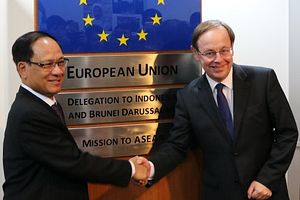On Tuesday, the European Union officially inaugurated its mission to the Association of Southeast Asian Nations (ASEAN) in Jakarta, another step toward strengthening a relationship between the two regional groupings.
The official inauguration ceremony of the EU Mission to ASEAN, which had opened in August last year, was marked on January 26 by the unveiling of a plaque by Patrick Child, the director general for budget and administration of the European External Action Service (EEAS), and Le Luong Minh, the current ASEAN secretary-general. Others present at the event included Derry Aman, the director for ASEAN dialogue-partners and inter-regional cooperation at the Indonesian foreign ministry, as well as the newly appointed and first dedicated EU Ambassador to ASEAN Francisco Fontan Pardo.
“I’m confident that the establishment of the EU diplomatic mission and the appointment of the ambassador to ASEAN will continue to further enhance ASEAN-EU cooperation,” Le Luong Minh said.
EU officials said that the new mission was part of a broader effort to elevate ties with ASEAN to the level of a strategic partnership (See: “Sustaining Europe’s Pivot to Asia: The EU-ASEAN Dimension”). While the two sides already have a strong relationship – the EU is ASEAN’s second largest trading partner, its biggest provider of foreign direct investment, and the biggest donor to the ASEAN Secretariat – since 2014 the EU has been looking to both broaden and deepen ties, including supporting ASEAN in the areas of connectivity, regional integration, sustainable development, and political and security issues and engaging more on regional and global matters ranging from climate change to terrorism.
“We try to elevate the relations we have with ASEAN to the strategic level,” Pardo, the EU envoy, told a press conference.
“This is very ambitious because we already have a very dense cooperation with ASEAN across a very wide range of sectors,” he added. “The idea is to try and see if we can bring it [the relationship] up to the highest possible political level.”
Child, the director-general at EEAS, said that the EU would continue to undertake a series of steps to realize the goal of a strategic partnership, including completing bilateral economic pacts with individual ASEAN member states with a view to eventually conclude a region-to-region free trade agreement (FTA). The EU has FTAs with Singapore and Vietnam but is still negotiating pacts with other countries such as Malaysia and Thailand (See: “Vietnam, European Union Ink New Free Trade Pact”).
“In the months to come, we intend to advance on our bilateral relations while keeping the regional trade agreement as the final objective,” Child said.
“We look forward to elevate the EU-ASEAN partnership to the strategic level, as we truly believe that our respective regions have a lot to benefit from each other experiences and agendas, as we are, after all, ‘partners in connectivity’, as you say in ASEAN,” he added.

































